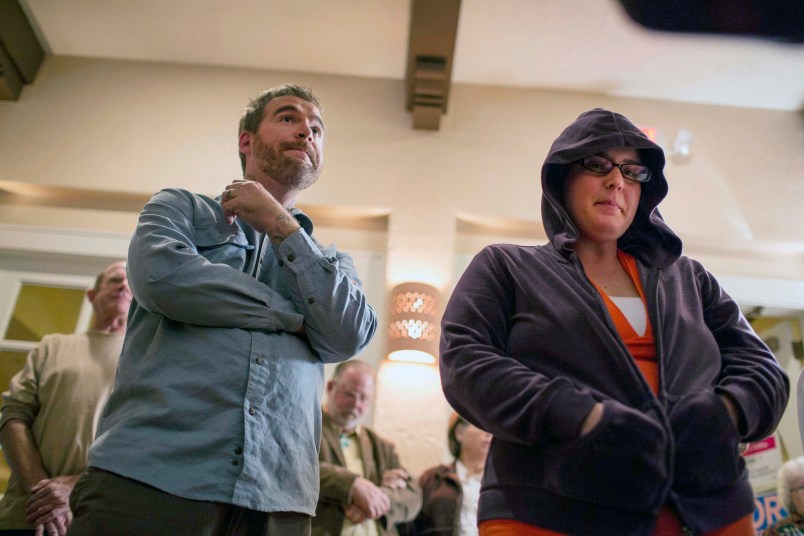Within minutes after early voting results revealed Albuquerque’s proposed 20-week abortion ban wouldn’t pass by a wide margin, reproductive rights activists let out a breath they had been holding for months. Early September polling had shown that the popular vote favored the city level ban, which would end the ability to provide later second- and all third-term abortions under any circumstance other than a direct threat to a pregnant person’s life. Yet by the time the votes were tallied, those who had cast ballots before Nov. 19 voted against the ban. Near final Election Day results put the vote at 55 percent of voters rejecting the measure; it was clear that the majority believed that a decision to have a later abortion should be left between doctor and patient.
The pro-choice movement that has seen a frustrating number of defeats recently. They have especially seen a surge of excessive restrictions known as targeted regulation of abortion providers, or TRAP, bills at the state level that have shuttered the doors of a number of abortion providers across the country. The loss of the 20-week municipal ban wasn’t just a victory for abortion rights themselves; it was also a validation of our belief that despite the vocal minorities creating laws in a number of key red states, the general population still stands with the pro-choice movement and believes that legal, safe abortion is a necessary part of medical care.
Just because pro-choicers see this result as a win, that doesn’t mean abortion opponents see the ban’s defeat as a loss. In fact, they feel they’ve won as well, or at the very least drawn a stalemate for the time being.
“While we lost this election we have won over many hearts and built amazing
bridges within the community,” wrote Bud and Tara Shaver, the transplants from Operation Rescue, a group known for its radical and violent tactics in the ’80s and ’90s and who led the campaign for Albuquerque’s 20-week ban. “We must resolve to proclaim even louder the truth about abortion, reach even further into our community and keep coming back until we win and establish justice for the babies.”
Anti-abortion activists have come up with a number of ways that they will change their tactics next time – and yes, they promise there will definitely be a next time. Among the retooling will be better, “less confusing” ballot language and a more nuanced campaign to convince people that fetuses with fetal anomalies are a blessing and that there are resources to help. They hope these tweaks will make a lack of exceptions in the ban seem less threatening.
Those areas, as well as better involvement from local churches, are where ban proponents think they can eke out a win during the next ballot measure. However, that still doesn’t mean that this go around was by any means a loss to them.
“Although the ban did not pass, public education efforts leading up to the vote not only raised widespread discussion but also created opportunities for the victims to be seen,” wrote Mark Harrington of the anti-abortion group Created Equal. “While late-term abortion may remain legal for now in ABQ, it has already become unthinkable to countless citizens who themselves witnessed faces of butchered children on our mobile billboards, handheld signs, or postcards.”
The Albuquerque campaign wasn’t just successful at getting graphic fetal remains photos into the pubic square (and, even better, the national media), but won when it came to placing a very public eye on Southwestern Women’s Options Clinic, one of just three clinics in the country that openly offers third trimester abortions. It also opened the door for the direct targeting of two of its doctors who perform those terminations.
Although Operation Rescue has long tried to close the clinic and file medical board complaints to try to revoke their licenses, it was the 20-week ban campaign that truly allowed anti-abortion activists to focus intently on the clinic’s doctors. Early in the summer, under the guise of “public awareness” for the campaign, extreme anti-choice groups canvassed the city with postcards [caution, graphic] with the doctors’ names, pictures, and the clinic address, calling them “killers among us.”
The tactic is by no means new. In fact, postcards with fetal remains and an abortion provider’s photo and information go back to the early days of Operation Rescue’s attempt to harass Dr. George Tiller into giving up his practice. They even escalated and used the same trick to convince his clinic workers to quit their jobs, too. It was a method of targeting, isolation, and implied consent for violence masquerading as “protection” that eventually contributed to Dr. Tiller’s murder.
Now, in Albuquerque, rather than it being called outright harassment, abortion opponents can claim it as just another plank in their ballot campaign. As long as there is an initiative to be voted on, centering the debate around Southwestern and its providers allows anti-choice activists to spotlight them, protest them, keep them under constant surveillance and scrutiny, even cross into the realm of harassment and intimidation, all while arguing that this is in fact a means of gathering support for an election measure.
When it comes to continuing to keep abortion access safe and legal, even into the later weeks of a pregnancy, the Albuquerque vote was a win for pregnant people and those who support their rights to medical care and bodily autonomy. Sadly, when it comes to protecting the clinics, medical centers and doctors who offer this care in Albuquerque, it is far, far to soon to declare any sort of victory.
Robin Marty is a freelance writer, speaker and activist, and the author of Crow After Roe: How Women’s Health Is the New Separate But Equal and How to Change That. Robin’s articles have appeared at Rolling Stone, Bitch Magazine, Ms. Magazine, In These Times, Truth Out, AlterNet, RH Reality Check and other publications.






